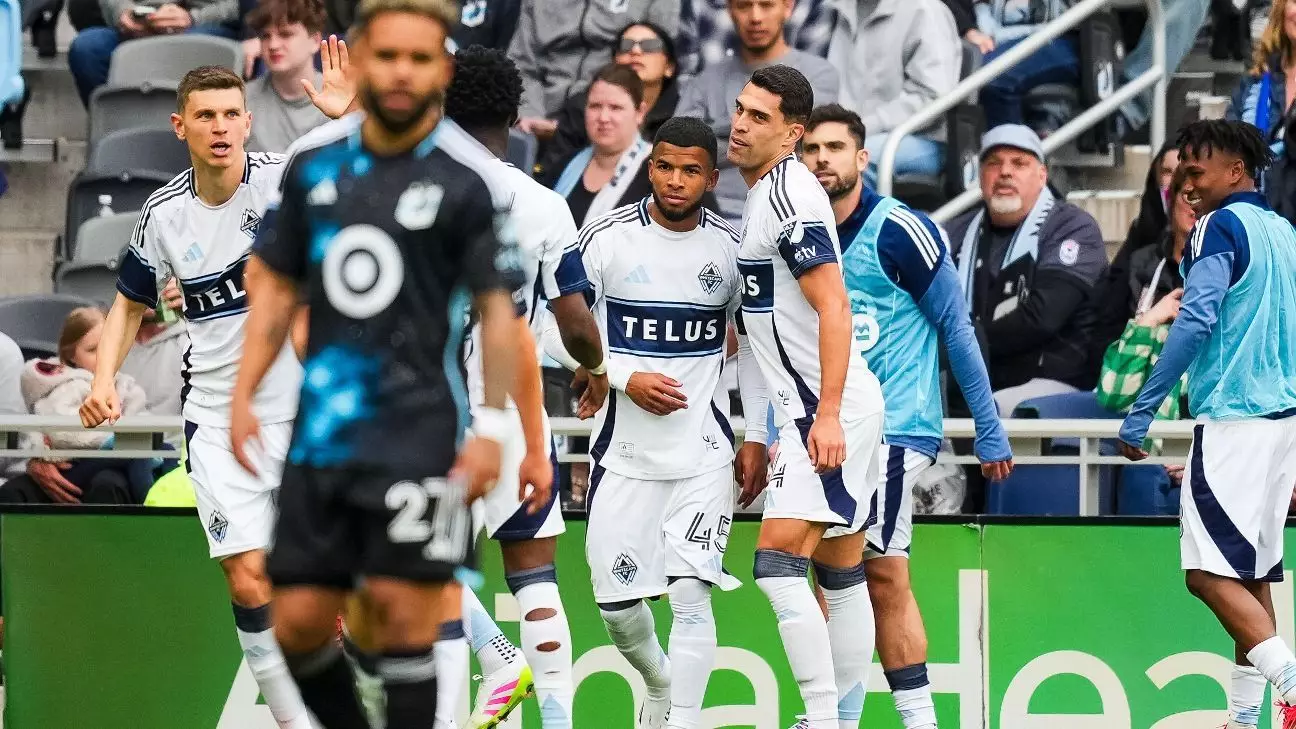The vibrant world of Major League Soccer (MLS) is often lauded for its competitive spirit and dynamic displays of athletic prowess. However, on a seemingly typical Sunday afternoon during a match between Minnesota United FC and the Vancouver Whitecaps, an unsettling incident surfaced, casting a shadow over the league’s commitment to inclusivity. In the 95th minute of a heated 3-1 victory for Vancouver, tensions flared when Minnesota’s Joseph Rosales became embroiled in a verbal confrontation with Emmanuel Sabbi from the opposing team.
This incident is more than just the usual pre- and post-game banter; it escalated to a level that invoked the MLS’s Non-Discrimination Policy, which aims to ensure a respectful atmosphere in a sport that thrives on camaraderie and mutual respect among players. Referee Drew Fischer, visibly caught in a difficult position, attempted to mediate the situation by consulting with both teams’ managers and captains. However, the absence of tangible evidence led him to allow the game to continue without further sanctioning Rosales, which, while perhaps a prudent decision in the moment, raises serious questions about accountability and the enforcement of these crucial policies.
The Aftermath: A League’s Responsibility
Following the match, the intensity of the situation did not simmer down. Reports indicated that there were still elevated tensions as players retreated to the tunnel, culminating in an alleged shove from Rosales, aimed at a Vancouver player. This incident puts MLS at a crossroads; it must now confront the reality that its approach to handling discrimination allegations is under scrutiny, and the league’s response must be robust and transparent.
Minnesota United’s statement echoed the sentiments of many involved. They acknowledged the allegation and stated their position firmly against any form of harassment or discriminatory behavior. However, such prepared responses beg the question: how effective are these statements when action is needed most? The league’s commitment to revisiting its policies is commendable, yet the culture that allows such incidents to occur must be examined holistically.
A Pattern of Inaction? Learning from the Past
Historically, MLS has faced its share of challenges related to discriminatory behavior, with other players subjected to similar incidents. For example, the league’s previous suspensions, such as the three-game ban for Philadelphia Union’s Kai Wagner and the six-game suspension for Dante Vanzeir, underscore a troubling trend. If these incidents reveal anything, it is the systemic issues within the league that seem to perpetuate a culture where players may feel emboldened to use slurs without fear of severe repercussions.
To combat this malaise, MLS, in collaboration with the Black Players For Change and the MLS Players Association, implemented a training program designed to educate players regarding unacceptable verbal behavior. While this initiative is a step in the right direction, the ultimate effectiveness of these programs remains to be seen. Effective change requires a shift not only in knowledge but in the very fabric of the league’s culture—an endeavor that demands time, consistent enforcement of policies, and the courage to confront uncomfortable truths.
Dialogue as a Catalyst for Change
Moving forward, the MLS must prioritize creating an environment that fosters open dialogue about discrimination and harassment. This incident should serve as a catalyst for meaningful conversations among players, management, and fans alike. It is imperative that all stakeholders—players from different backgrounds, coaching staff, and fans—engage in discussions about what respect looks like on and off the pitch. Only through communal effort can the league harness the power to genuinely transform its culture.
While the league’s quick reaction to investigate this reported violation is a necessary start, it must not stop there. Transparency in the outcome of the review and subsequent measures taken will be crucial in restoring faith in the league’s dedication to eradicating discrimination. The time for complacency has passed; MLS must rise to the challenge and demonstrate that it stands as a bastion against discrimination in sports, ensuring that diversity is not just accepted but celebrated.


Leave a Reply